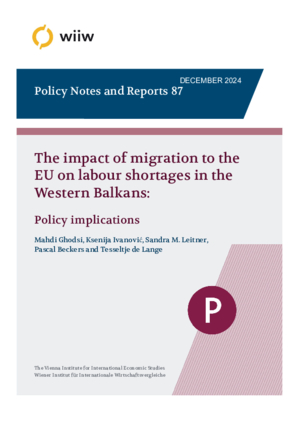The impact of migration to the EU on labour shortages in the Western Balkans: Policy implications
Pascal Beckers, Tesseltje de Lange, Mahdi Ghodsi, Ksenija Ivanović and Sandra M. Leitner
wiiw Policy Note/Policy Report No. 87, December 2024
23 pages including 4 Figures and 2 Boxes
Emigration from the Western Balkans (WB) to the European Union (EU) has long been a significant source of workers for the EU. In light of population ageing and the twin (digital and green) transitions in the EU, and as candidate countries for EU membership, their contribution may be more relevant than ever. At the same time, the outflow of workers from the WB has exacerbated labour and skill shortages across occupations in the region, depleting the talent pool needed for economic development. This challenge – while also an opportunity – requires immediate attention. Based on new research findings, this policy brief highlights incentives that encourage (i) emigration from the WB region and (ii) immigration to EU countries. In particular, it examines the impact of emigration on labour shortages in the WB and proposes timely policy recommendations for WB and EU policy makers. The policy recommendations are in three main categories: (i) industrial policy to address labour shortages and boost technological development, (ii) migration and skills development policies, and (iii) improving data quality for market research and academia.
Keywords: Pull and push factors of migration, migration aspirations/desires, destination decision, choice model, migration policy, skills development, Western Balkans, EU
JEL classification: F22, O15
Countries covered: European Union, Western Balkans
Research Areas: Labour, Migration and Income Distribution
